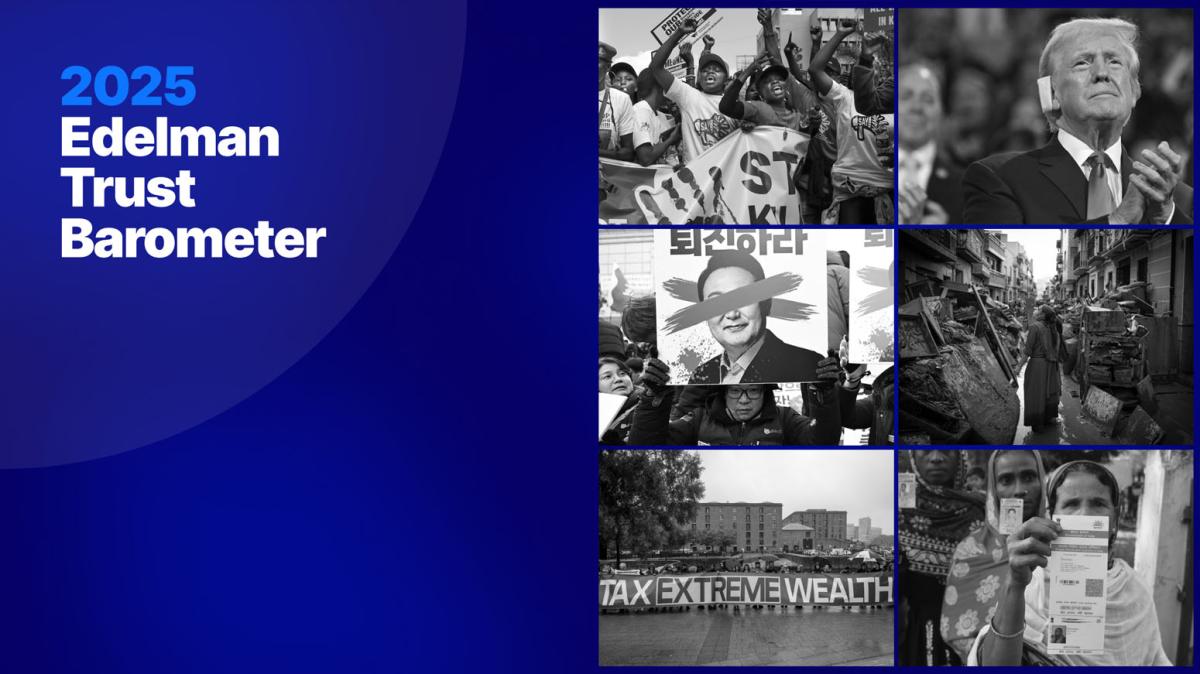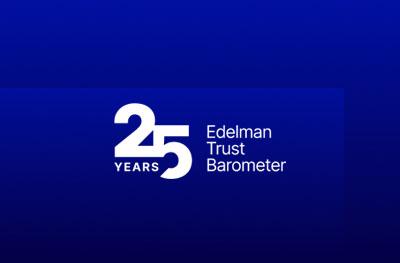"Read the room” is something we’ve all thought – or said out loud – after someone spoke out of turn, brought up a controversial topic, or ignored social cues. “Read the room” is not typically a piece of advice given to leaders who are deciding how best to address business or societal issues, but based on findings from the 2025 Edelman Trust Barometer, it should be.
We are living in a time of grievance, defined by a belief that government and business make our lives harder and serve narrow interests, and that wealthy people benefit unfairly from the system while regular people struggle. In fact, according to the Edelman Trust Barometer, 61 percent of respondents have a moderate or high sense of grievance. People around the world feel betrayed by leaders and left behind by the societal institutions meant to support and serve the public.
This finding is disheartening, and it’s easy to feel discouraged as an institutional leader – like a CEO or government official – to know how to address people. In fact, it’s tempting to put on blinders, hunker down, and not say anything at all. Why risk triggering someone’s anxiety or anger over an issue, especially when prevalent across all demographics and in most countries. Our research shows that leaders should do the opposite. They should read the room: listen to the circumstances and stories of the aggrieved to uncover what stakeholders want, expect, and need from you to restore their faith in the system.
Leaders’ Uphill Battle Amid Widespread Grievance
This global sense of grievance comes from people feeling mistreated by government and business on an institutional level, as well as by the leaders in those organizations, journalists, and the wealthy.
The Trust Barometer has long measured trust in institutions (business, government, media, and NGOs), and it has also studied the public’s sentiment about leaders in society. Since 2021, we have found that a majority of respondents worry that journalists, government leaders, and business leaders are purposely misleading people. Over the last four years, the levels of worry have risen by over 10 points, reaching an all-time high in 2025.
The public not only distrusts people holding certain executive titles or positions – they feel the system is elevating the wealthy at the expense of ordinary people. A majority are convinced that the wealthy are not paying their fair share of taxes (67 percent) and that their selfishness causes problems for everyone (65 percent).
Grievance seeps into nearly every aspect of society and has a massive impact on how society can – and cannot – function. People with a high sense of grievance distrust all four core institutions, in addition to distrusting CEOs, as well as innovations like artificial intelligence. For any organization to succeed now and in the years ahead, its leaders cannot ignore grievance.
Listen to Lead
There are some specific, and data-backed, guidelines that institutional leaders can leverage to build trust and reduce grievance – all of which are predicated on one seemingly straightforward but often challenging first step: listening. Listening to stakeholders – especially those consumers or employees who have a high level of grievance – about their fears, expectations, and needs must be the foundation for all action within the organization or outward into society.
These are some next steps to take:
- Leave your information bubble: To learn how the public and your stakeholders are really feeling, you cannot stay comfortable. If you are used to getting information from certain news outlets, add some from a different perspective to your media diet. Search current events on social media platforms to read users’ authentic reactions in those moments. Listen to podcasts or watch YouTube series perhaps not aimed at you, but aimed at those you sell to or serve.
- Keep your values consistent: Hearing what people really have to say doesn’t mean you should immediately respond to every criticism or demand. Take in the feedback and decide how to move forward based on a thoughtful and consistent set of values that are foundational to your organization. The context in which you and your organization exist is volatile – being clear on your values can steady the ship.
- Act where it makes sense: Those with a high sense of grievance do not want business and its leaders to back away – they just want them to lean in where it's most effective. Regardless of grievance level, respondents believe business leaders have permission to engage with a societal issue if the company contributed to the problem, the issue harms their stakeholders, they can have a major positive impact on the issue, or if taking action would improve the business’s performance.
The sense of grievance in society has reached a breaking point: Four in 10 see hostile activism (attacking people online, intentionally spreading disinformation, threatening or committing violence, and/or damaging property) as a viable means to drive change. We cannot accept this as our new norm. So, it’s time for leaders to be humble, listen, and earn trust to lift society out of this crisis of grievance.
Kirsty Graham is U.S. CEO




